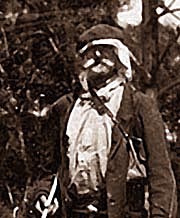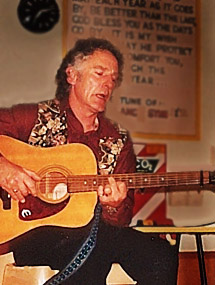Guitar
capo 3rd fret, play these chord-shapes
C
Dm
Look down the road, and who do you see
F
C
An old man in ragged clothes, a tramp to you and me
Must be summer, 'cause he's back again
Russian Jack's a tramp: yeah, and that's his game.
He'll chop a little wood, for a meal and a cup of tea
And sleep in your barn, if it looks like rain
He don't like children, or so they say
When Russian Jack's around, you'd better stay away.
Em F
Don't you go down to the river
Em F
Better stay away
Em F
Don't you go down to the river
C - Dm - F - C
. . . Russian Jack's there today.
A
white Russian immigrant, or so the story goes
Came here in the '20s, after revolution days
Ever since then, he's wandered dusty roads
His swag on his back, and his billy swinging free
They say he's got a sister, on the East Coast somewhere
Who he visits every Christmas, to drink a Russian beer
The last time I saw him, was nineteen sixty-two
On the side of the road, beneath a shady tree
Don't you go down to the river
You'd better stay away
Don't you go down to the river
. . . Russian Jack's there today.
Hear
that he died, in an old people's home
His legs were so crippled, he could no longer roam
Sad ending for, a harmless old man
Who didn't seem to fit, any kind of social plan
Look
down the road, and who do you see
An old man in ragged clothes, a tramp
to you and me
Must be summer, 'cause he's back again
Russian Jack's a tramp: yeah, and that's his game.


